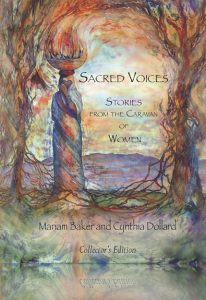 You want to honor women working to create peace in today’s turbulent world. Does your book help to do that?
You want to honor women working to create peace in today’s turbulent world. Does your book help to do that?
I believe it does by allowing greater bridges and understanding between Muslim, Christian, and Jewish women, highlighting our similarities rather than differences in terms of the stories we tell of our religious ancestors.
Your book has recipes, illustrations, poetry, and dreams. Why was it important to convey Islam through these various methods?
More important than conveying Islam was the stories from what I call the Caravan of Women. I wanted to include all aspects of our lives as women, in our shared stories of life and death, pregnancy, birth, abandonment. Recipes bring us into our ancient tradition of wisdom through stories, cooking, and shared meals.
Do you believe your research can help dispel some of the misconceptions about a religion followed by more than 2 billion people?
Yes! That is one of the reasons I wrote the book and did the research, especially considering that the Islamic faith is reflected in a life of compassion and mercy towards fellow humans. Throughout history, Islamic women have lived their lives in expression of this foundational tenet of the faith.
How does your work give a voice to those who have been marginalized or ignored?
The focus on the women’s stories highlights the importance of women. An important example is the story of Khadija, wife of Prophet Muhammad, who is often considered the first Muslim. She was powerful, and what today we would call a CEO…She is a person of great ethics, and morality, a philanthropist within her community, as well as an incredible business woman-before she meets Muhammad. When women realize that they have a prominent place within the founding of the religion, it breaks the hypnotic overlay that women are second-class citizens.
Since you grew up in a more progressive, western culture in the U.S., how did you become attracted to Sufism?
It’s a path that includes embodied spirituality and active prayer, which is very attractive to me as a dancer. I’m someone who longs to worship with body, heart and soul, not just with the mind.
Why did you transition from Catholicism to Sufism?
It didn’t feel like a transition at all, only a deepening into the embodiment of the sacred.
Why did you decide to turn your involvement in spirituality into a livelihood?
This has been an organic process. I never chose it as a livelihood. It continues to be revealed and unfold in ways that surprise me. This is my passion, and I feel so grateful to be engaged in this work.
Why did you become a whirling dervish and what does it signify in Sufism?
One of our methods of prayer in the Mevlevi Order is whirling, or turning. As early as the 13thcentury, a group of students began following Sufi mystic Rumi into this practice. The turning challenges us on every level: the physical, the mental and spiritual. It gives me great joy.
Has your experience as a mother of five helped you to be a better spiritual midwife?
One hopes that that is true. Certainly all our experiences enriches our ability to be present, which is what spiritual midwifery is all about, whether midwifing a physical birth, or offering assistance during the dying process, or at any point in between. Anything that gives us more masterful tools is of great value.
You teach workshops and lead retreats around the world. How can your teachings help people in their everyday lives?
The teachings of gratitude, forgiveness, a deeper listening to the inner voice of guidance, and courage are of great value at this moment in time. Discovering more what it is to be human, stretching our capacity for wisdom, kindness, and generosity, will only enhance our ability to live together in harmony.
If there was only one message you could convey to readers, what would it be?
Love yourself, treasure, honor, and forgive yourself. Celebrate life; find your wings; be free.
**********************
A whirling dervish, Mariam “turns,” which is a deeply spiritual practice in Sufism. It represents an entrance through a doorway to a more meaningful spirituality that can pull people together and embrace our common humanity.
The author of Woman As Divine: Tales of the Goddess, Mariam has given workshops in Brazil, Germany, Ireland, Russia, Tunisia, Australia, and across the U.S. She is the Executive Director of The SoulWork Foundation, which encompasses Embodied Spirituality (the connection of spirit, body and sexuality), and the marriage of psychology and spirituality.
A former director of the Theater of Healing, Mariam is a senior teacher for Sufi Ruhaniat International and a leader in the Dances of Universal Peace. A mother of five children, Mariam considers herself a spiritual midwife. She lives in Marin County, California.
